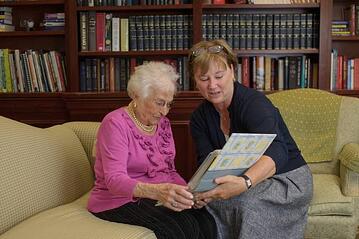 Experts say it comes with the territory. The odds are if you’re caring for elderly parents for any length of time without much assistance-- it’s a given--you HAVE caregiver stress. No one tells you going into this role that part of the plan of caring for the well-being of a loved one is also taking care of your own.
Experts say it comes with the territory. The odds are if you’re caring for elderly parents for any length of time without much assistance-- it’s a given--you HAVE caregiver stress. No one tells you going into this role that part of the plan of caring for the well-being of a loved one is also taking care of your own.
How do you identify the signs of caregiver stress?
According to the findings, mood disturbances (persistent low moods, depressive episodes, feelings of isolation, etc.) top the list of caregiver stress signals. Added to this is the misuse of prescriptions drugs, self-medicating OTC drugs and alcohol taken to ease the symptoms.
While it’s hard to self-diagnose for caregiver stress, you may be able to identify with some of these emotional roller-coasters, outside of the normal, everyday stressors.
7 Caregiver Stress Signals:
- Abuse of alcohol or drugs, including prescriptions drugs to cope with care-giving challenges
- Constant feelings of worry, persistent fear or paranoia
- Sleeping too little or just the opposite, sleeping too much yet, complaining of exhaustion
- Regular headaches, body aches and general sore muscles not associated with your workout/physical exercise
- Surprising outbursts of anger; emotional sensitivities (easily irritated)
- Feeling tired, overwhelmed and often sad on any given day
- Can’t control your weight; gaining or losing a noticeable amount in a short period of time
Speak with a counselor, therapist or health care specialist if you are going through any one (1) or several of these signs. Immediate consultation with a counselor will prevent uncharacteristic acts of harm channeled toward a loved-one due to emotional strain.
When it’s “Okay”…
Because many family caregivers feel it’s their duty to immerse themselves into the senior care role, few ask for help; they may ask for a listening ear, but even fewer seek professional advice. To help, here is a “run-down” of what therapists say is okay for you to be feeling:
It’s OKAY to occasionally…
- Feel frustrated and lose patience
- Feel fear, guilt and sorrow
- Ask for help from family, friends and health professionals
- Feel you don’t have a full handle on things; remember, you weren’t given a book of instructions
- Apologize for venting and losing your temper
- Want to be away from your loved one, arrange for adult day-care or spend time alone
Stress is an adjunct to care giving; although “it comes with the territory” family care giving cannot be likened to professional care-givers, like nurses who are taught to remove themselves emotionally after a day’s work.
Learn coping techniques. And, while not dismissing your feelings of stress--learn what emotions are okay and where the boundary lies--then take good care not to cross it.
Key Takeaways:
- Experts say if you’re caring for elderly parents for any length of time without much assistance-- it’s a given--you HAVE caregiver stress.
- According to the findings, mood disturbances (persistent low moods, depressive episodes, feelings of isolation, etc.) top the list of care giver stress signals.
- Consultation with a counselor will prevent uncharacteristic, unstable behavior channeled toward a loved-one due to emotional strain.
- Few care givers ask for help; although they may ask for a listening ear, even fewer seek professional advice.
- Many of the emotions care givers exude is “okay” under the circumstances; learn how to cope with challenges and not cross the boundary into mental illness.
Assisted Living Options
If you are interested in learning more about assisted living options please contact United Methodist Homes or visit our website to learn more!


